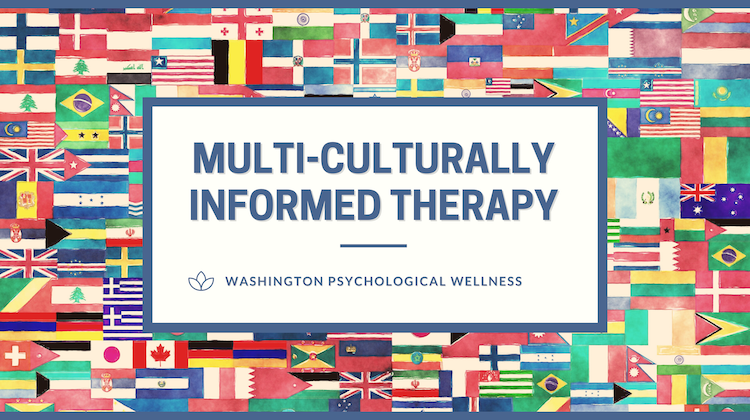Signs Your Therapist is Multi-Culturally Informed and Why It’s Important
Culturally Informed Therapy
For many, seeking therapy is a scary prospect. When you’re struggling to be the best version of yourself, it can feel like sending your inner-most thoughts and feelings into a void. We know that building trust with your therapist is an integral part of reducing anxiety and shame, but what if you were nervous about disclosing your cultural background? This article will discuss why therapists must be culturally competent with their patients, the signs of a multi-culturally skilled therapist, and what to do if your therapist is not multi-culturally informed.

What is Cultural Competence?
Cultural competence refers to understanding the standard practices and beliefs of people from different racial or ethnic groups. It is helpful for therapists to know their patients’ worldview, life experiences, history, language, religion, and values.
Cultural competence includes knowledge about customs, traditions, holidays, foods, religious practices, etc. It also extends to an understanding of how values and customs can differ between cultures and an understanding of what it means to be a minority individual in the greater US culture.
Why is Cultural Competence Important in Therapy?
According to the American Psychological Association, research shows that people who are members of racial/ethnic groups who frequently experience discrimination are more likely than those who are not members of these groups to develop stress-related disorders. This is particularly true if they believe that discrimination is due to internal (personal) reasons (e.g., “I’m not good enough”) rather than external (societal) reasons (e.g., “Society is unfair”).
Minority individuals often face unique stressors that can impact mental health. For example, stigmatized people may internalize stereotypes about their group(s), leading to shame and hurt. They’re also at risk of experiencing prejudice, which can heighten their feelings of fear, anger, or anxiety.
What are the Signs of Culturally Competent Therapy?
Here are some signs to look for—as suggested by the American Psychological Association—that indicate your therapist is multi-culturally informed and competent:
- They’re aware of your cultural background. This could be signaled by them asking you questions about your family and culture (e.g., how many grandparents do you remember? How important is religion/spirituality in your life?).
- They’ve read and understood relevant research. This could be signaled by them referencing studies about minority groups and mental health (e.g., understanding the impact of internal biases and stereotypes vs. external realities on one’s mental health).
- They’re willing to seek professional development opportunities. This could be signaled by their attendance at cultural competence trainings, as well as reading books/articles regarding cultural competence. Some states even require cultural competency continuing education (CE) training for therapy licensure.
- They engage in cultural humility practices. This could be signaled by their self-awareness and acknowledgment of how their own implicit biases may be impacting their overall worldview, perception, and life experiences.
- They’re comfortable with different ways of doing things. This could be signaled by being authentically open, curious, and respectful of differing viewpoints due to multicultural differences. In addition, your therapist should respect your customs, traditions, and religion and refrain from overgeneralizing or stigmatizing cultural stereotypes.
- They’re not afraid to ask you questions. Instead of ignoring them, this could be signaled by them asking about your experiences with racism, discrimination, prejudice, etc.
What to Do If You Don’t Feel Comfortable with Your Therapist’s Cultural Competence?
If you don’t feel comfortable with your therapist or feel they have crossed a boundary, it’s essential to be intentional about how you handle this. Here are some suggestions:
- Be honest. Finding the right therapist is a process that requires sharing some of your most intimate and vulnerable parts of yourself (e.g., your struggles with depression or anxiety, your trauma history). Your therapist needs to understand who you are and what makes you, well, YOU. Be honest with your therapist and utilize the session to be open and to express your concerns—perhaps this could be used as a time for reflection, growth, and healing.
- Find a therapist that specializes in your culture. This might mean they’re not able to see you as regularly or help you with everything you might want to discuss. However, your therapist needs to be able to understand and appreciate your unique background and experience.
- Consider changing therapists. If you feel like there is a disconnect between you and a therapist, don’t be afraid to find a new one. Again, therapy requires trust and understanding, and if you don’t feel like your therapist is receptive to your cultural needs, maybe it’s time to find a new therapist.
All in all, it’s important to remember that the right fit for a therapist takes time and patience.
Be intentional about what you’re looking for in a therapist and how you’d like to be treated from the very beginning. Make sure that your therapist is culturally competent, but also make sure that you feel comfortable with them.
If this isn’t the case, then change must happen.
Ready to SeeK Multi-culturally Informed Therapy?
At Washington Psychological Wellness, our clinicians are proud to provide an inclusive, affirming, and multi-culturally informed psychotherapeutic environment.
Our therapists value honesty, authenticity, integrity, inclusivity, and equal respect for all individuals regardless of race, ethnicity, nationality, class, caste, religion, belief, sex, gender, language, sexual orientation, gender identity, sex characteristics, age, health or another status.
We further pride ourselves on delivering empirically validated psychotherapeutic treatment approaches exclusively tailored to each individual’s unique circumstances and needs.
Ready For Help?
Contact us today for a complimentary 15-minute initial consultation to learn how multi-culturally informed therapy can help you or a loved one!
